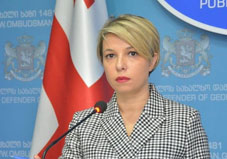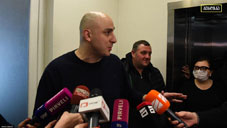The News in Brief
Friday, February 26
Prepared by Liza Norwich-Gerwik
Public Defender believes that the state should respond strongly to Vakho Sanaia's attack
Georgia Public Defender Nino Lomjaria believes that the state response to the attack on Formula One journalist Vakho Sanaia should be tough. According to him, the profession of a journalist and his independence is the most important sign of the state's democracy.
"If a journalist is attacked for his or her activities, this criminal act requires an adequate and rigorous response to prevent similar incidents in the future. ... reads a statement issued by Lomjaria.
EMC considers the attack on Vakho Sanaia as a result of aggressive public rhetoric towards journalists
The Center for Human Rights Education and Monitoring believes that it is necessary to conduct a case of violence against Formula One journalist Vakho Sanaia without delay.
The organization believes that another part of the qualification of "violence" should be added, which provides for responsibility for crimes committed on the grounds of "hate".
"In our view, such cases are the result of polarization of the political environment, aggressive public rhetoric against opponents and critical media organizations and journalists, which exposes the risks of violence and confrontation to the micro-social level and creates an insecure and hostile environment for political, civic and media actors." In a statement.
If Nika Melia pays bail, the prosecutor's office is ready to request a change of detention
Prosecutor Amiran Guluashvili held a briefing after the Court of Appeals declared Melia's complaint inadmissible.
According to him, if Nika Melia, the Chairman of the United National Movement, pays the amount [40,000 GEL] that the court order him on bail on November 3, the prosecutor's office is ready to apply to the court to change the detention.
"The prosecution has repeatedly stated that the detention of Nikanor Melia is not an end in itself of the prosecutor's office. "Accordingly, in case of fulfillment of the bail conditions set by the defense as determined by the judge on November 3, the prosecution expresses its readiness to apply to the Tbilisi City Court to change the bail used against the accused Nikanor Melia, " said the head of the Prosecutor's Office.
Yesterday, on February 25, the Tbilisi Court of Appeals did not accept Melia's appeal. Under the current legislation, the measure of restraint imposed during the substantive hearing of the case is not appealed in the Court of Appeals, although Melia's lawyers considered this norm unconstitutional. Melia's lawyer, Dimitri Sadzaglishvili, told RFE / RL that if a judge of the Court of Appeals appealed to the Constitutional Court to consider the norm unconstitutional, the case of Nika Melia would be suspended until the Constitutional Court rules.
On the night of February 17, the Tbilisi City Court granted the motion of the Prosecutor's Office and commuted the previous measure of restraint imposed on Nika Melia - bail. Prosecutors demanded Melia's arrest after he refused to pay bail. Prior to the court decision, the majority of the Georgian Dream in the Georgian Parliament lifted the immunity of Nika Melia MP.
As early as June 27, 2019, Melia was sentenced to 30,000 GEL bail as a deterrent, then the Parliament lifted his immunity for the first time. Melia paid 30,000 GEL for the first time, but after the electronic bracelet was demonstratively removed at a rally in front of the parliament in November 2020, the Prosecutor General's Office once again appealed to the court to release Nika Melia on 100,000 GEL bail, although the court set 40,000 GEL, which he did not pay. This was followed by a request from the prosecutor's office to aggravate the measure of restraint - imprisonment.
Military exercises are underway in the occupied Tskhinvali region
In the villages along the occupation line, in Nikozi and Ergneti, you hear the sound of explosions and gunfire coming from the occupied territories in the morning.
The personnel of the occupation forces are undergoing military training at the occupied village of Dzartsemi in the Didi Liakhvi gorge. According to Ossetian media, the exercise began on February 19 with the training of snipers on mountainous terrain and the tactics of destroying conventional opponents. In recent days, artillery training is already underway.
The sound of explosions is so loud that the windows of houses in Georgian villages are ringing. Lika Kasradze, a resident of the village of Ergneti, says that the sound of explosions is a common occurrence for the people of Ergneti. "It has been going on for years. Exercises are held periodically.
The State Security Service also responded to the ongoing military exercises in the occupied territories. The SSU says that the occupying forces of the Russian Federation stationed in the occupied Tskhinvali region have been conducting illegal military exercises on the ground from time to time. The "hot line" is activated and the EUMM is informed.
"Illegal military exercises conducted by the Russian occupation forces are a key issue for the Incident Prevention and Response Mechanism (IPRM) and the Geneva International Discussions. Illegal military exercises significantly damage the security environment on the ground and aim to instill a sense of fear and insecurity in the local population. "The Russian Federation is responsible for all illegal actions in the occupied territories," the statement said.
The fourth military base of the Russian Federation was located in the occupied Tskhinvali region after the August 2008 war. The military servicemen of this base conduct drills at the occupied village of Dzartsemi from time to time. In the Georgian villages near the occupation line, you especially hear the sound of artillery drills.
Public Defender believes that the state should respond strongly to Vakho Sanaia's attack

Georgia Public Defender Nino Lomjaria believes that the state response to the attack on Formula One journalist Vakho Sanaia should be tough. According to him, the profession of a journalist and his independence is the most important sign of the state's democracy.
"If a journalist is attacked for his or her activities, this criminal act requires an adequate and rigorous response to prevent similar incidents in the future. ... reads a statement issued by Lomjaria.
EMC considers the attack on Vakho Sanaia as a result of aggressive public rhetoric towards journalists

The Center for Human Rights Education and Monitoring believes that it is necessary to conduct a case of violence against Formula One journalist Vakho Sanaia without delay.
The organization believes that another part of the qualification of "violence" should be added, which provides for responsibility for crimes committed on the grounds of "hate".
"In our view, such cases are the result of polarization of the political environment, aggressive public rhetoric against opponents and critical media organizations and journalists, which exposes the risks of violence and confrontation to the micro-social level and creates an insecure and hostile environment for political, civic and media actors." In a statement.
If Nika Melia pays bail, the prosecutor's office is ready to request a change of detention

Prosecutor Amiran Guluashvili held a briefing after the Court of Appeals declared Melia's complaint inadmissible.
According to him, if Nika Melia, the Chairman of the United National Movement, pays the amount [40,000 GEL] that the court order him on bail on November 3, the prosecutor's office is ready to apply to the court to change the detention.
"The prosecution has repeatedly stated that the detention of Nikanor Melia is not an end in itself of the prosecutor's office. "Accordingly, in case of fulfillment of the bail conditions set by the defense as determined by the judge on November 3, the prosecution expresses its readiness to apply to the Tbilisi City Court to change the bail used against the accused Nikanor Melia, " said the head of the Prosecutor's Office.
Yesterday, on February 25, the Tbilisi Court of Appeals did not accept Melia's appeal. Under the current legislation, the measure of restraint imposed during the substantive hearing of the case is not appealed in the Court of Appeals, although Melia's lawyers considered this norm unconstitutional. Melia's lawyer, Dimitri Sadzaglishvili, told RFE / RL that if a judge of the Court of Appeals appealed to the Constitutional Court to consider the norm unconstitutional, the case of Nika Melia would be suspended until the Constitutional Court rules.
On the night of February 17, the Tbilisi City Court granted the motion of the Prosecutor's Office and commuted the previous measure of restraint imposed on Nika Melia - bail. Prosecutors demanded Melia's arrest after he refused to pay bail. Prior to the court decision, the majority of the Georgian Dream in the Georgian Parliament lifted the immunity of Nika Melia MP.
As early as June 27, 2019, Melia was sentenced to 30,000 GEL bail as a deterrent, then the Parliament lifted his immunity for the first time. Melia paid 30,000 GEL for the first time, but after the electronic bracelet was demonstratively removed at a rally in front of the parliament in November 2020, the Prosecutor General's Office once again appealed to the court to release Nika Melia on 100,000 GEL bail, although the court set 40,000 GEL, which he did not pay. This was followed by a request from the prosecutor's office to aggravate the measure of restraint - imprisonment.
Military exercises are underway in the occupied Tskhinvali region
In the villages along the occupation line, in Nikozi and Ergneti, you hear the sound of explosions and gunfire coming from the occupied territories in the morning.
The personnel of the occupation forces are undergoing military training at the occupied village of Dzartsemi in the Didi Liakhvi gorge. According to Ossetian media, the exercise began on February 19 with the training of snipers on mountainous terrain and the tactics of destroying conventional opponents. In recent days, artillery training is already underway.
The sound of explosions is so loud that the windows of houses in Georgian villages are ringing. Lika Kasradze, a resident of the village of Ergneti, says that the sound of explosions is a common occurrence for the people of Ergneti. "It has been going on for years. Exercises are held periodically.
The State Security Service also responded to the ongoing military exercises in the occupied territories. The SSU says that the occupying forces of the Russian Federation stationed in the occupied Tskhinvali region have been conducting illegal military exercises on the ground from time to time. The "hot line" is activated and the EUMM is informed.
"Illegal military exercises conducted by the Russian occupation forces are a key issue for the Incident Prevention and Response Mechanism (IPRM) and the Geneva International Discussions. Illegal military exercises significantly damage the security environment on the ground and aim to instill a sense of fear and insecurity in the local population. "The Russian Federation is responsible for all illegal actions in the occupied territories," the statement said.
The fourth military base of the Russian Federation was located in the occupied Tskhinvali region after the August 2008 war. The military servicemen of this base conduct drills at the occupied village of Dzartsemi from time to time. In the Georgian villages near the occupation line, you especially hear the sound of artillery drills.
